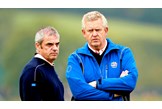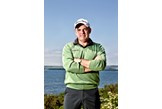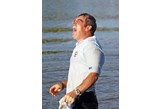INTERVIEW: Team Europe captain Paul McGinley
Published: Last updated:
Paul McGinley may be something of a lucky charm to Europe’s Ryder Cup team. His playing period slotted neatly between defeats in 1999 and 2008, while his assistant captaincy contributed to European successes in 2010 and 2012. Here, he talks about his plans to maintain what is an unblemished Ryder Cup record.
“The captain’s job is to build an environment which enables each guy in the team to go out and play his best. Overall communication is key too, alongside treating each player as an individual and with respect. But it’s also my job to turn up the volume thanks to the play inside the ropes. I want this to be a very noisy Ryder Cup. I want people to be as passionate about watching the Ryder Cup as I am as captain and was as a player. However, we all know there’s a line. So we have to make sure that the fans don’t cross that line. However, being in the home of golf in Scotland, I don’t have any worries on that score.
“I have been around The Ryder Cup scene long enough to know it is the one contest in sport you cannot call. Yes, we have won on the last two occasions at Celtic Manor and Medinah, but only by the narrowest of margins. I’m fully aware that if the cards had fallen slightly in the other direction on those final days we would be going to Gleneagles on a run of three consecutive defeats. The Americans will be formidable opponents.
“In my five appearances in Ryder Cups I have learned many lessons, but one of the most important is that momentum is crucial in team matchplay and never was that made clearer than at Medinah on the Saturday night. I remember Ian Poulter in the locker room after he made those five birdies to win the final match. He was very quiet and calm and he looked at us all and said: ‘We have a pulse.’ Before then, if it had been a boxing match, the referee would have probably stopped the fight because we were so much on the ropes. But because of what Ian and Rory did (and Sergio and Luke in the match before) we had momentum.
“I don’t think I can do Medinah justice with words. It was such an amazing day, which captivated people around the world whether they were golf fans or not. I’ve had people come up to me over the past two years and say ‘you know I’m not really interested in golf, but I couldn’t leave the TV when that Ryder Cup was on!’ That’s how special it was.
“Sam has probably had the most influence on me in terms of playing team golf in my career. My first captain in The Ryder Cup in 2002, he’s taught me a huge amount and has continued to do so over the years. Des took me under his wing when I was a rookie and he gave me tremendous advice which was not only valuable then but has continued to ring true for me throughout my career.”
 What qualities do you bring to the role?
What qualities do you bring to the role?
“The captaincy is unique in that the Seve Trophy gives us the chance for a trial run. I had two goes at that and both times came through with teams that were underdogs on paper. I’ve also been a Ryder Cup vice-captain three times. I wasn’t making the big decisions then, of course, but I was contributing. They went well and we won on two occasions, so from that point of view, I’m well-qualified. From a playing point of view, I wasn’t though. But there is no direct relationship between being a great player and being a great captain.”
What have you learned from the captains you assisted?
“I learned a lot from Nick Faldo’s captaincy. The team didn’t win, but he did a lot of things right. He made decisions that were criticised but turned out to be correct. Picking Ian Poulter, for example. And he took Martin Kaymer along to sit in the team room. Lo and behold, Kaymer holes the winning putt four years later. I learned organisation from Monty. He asked his vice-captains’ opinions but he always made the last call himself. Ollie was the same. A captain has to filter all the information, sort it out in his head, then go his own way.”
You’ve said you will pick your wildcards on form – how much of a factor is that?
“It’s the biggest determining factor, but it’s not the only one. Form is well above 50 per cent of the consideration.”
If Ian Poulter is mediocre in that ‘meaty’ period, is he an exception?
“Nobody is an exception. I’m not going to give anybody an ‘out’ by saying that they would be an exception. Poulter knows he has to play well to get in. I know he has to play well. I’m not going to give anybody a guarantee of a pick.”
Have you affected the course set-up?
“I’ve got full input as the home captain. I’ve had several meetings and I’ve also gleaned an awful lot of things from my experience in five Ryder Cups. Different captains have had different views – both European and American – and I’ve tried to take the best things from each of them. One of the things I’m very conscious of is not out-smarting myself. I don’t want to set it up too tricky so it’s disadvantageous to Europeans. Fifteen years ago you could probably have said the Europeans were the straighter hitters and the Americans the longer hitters, but that’s changed. The teams are so well balanced these days it’s impossible to make those sorts of generalisations. If I set up Gleneagles to suit short hitters, then you’re going to find someone like Rory McIlroy will lose his biggest strength – length off the tee. So, I’m very conscious of not out-smarting myself. I can promise there won’t be anything out of left field in terms of course set-up.”
Seve had his players playing 17 and 18 again and again in practice in 1997. Will you do something similar this time?
“Gleneagles is going to be a fascinating finish. The 14th is a driveable par 4, the 15th is a standard par 4, the 16th is a par 5, the 17th is a par 3 and the 18th is a par 5. A lot can happen on those sort of holes, so there’s a real chance of volatility at the end of every match, which is going to make it incredibly exciting viewing – but not so good on the hearts and nerves of the players and captains! I have some ideas about practice sessions and what we’re going to do in them, but I can’t obviously divulge those at this stage!”
What will the 18th hole look like?
“There will be no rough around the green. That’s how Jack Nicklaus designed it originally. There are lots of run-off areas, so it’s an incredibly difficult green to hit and it runs off in all directions. There is a real chance of volatility on the last. That’s what Jack intended when he designed it –with the Ryder Cup in mind. He designed it so only a perfect shot will hold the green. There will be lots of drama around that 18th green.”
Do you buy into the idea Europe has been successful because the players leave their egos outside the team room?
“I can’t answer that because I’ve never been in an American team room. From the outside looking in, honestly you can’t tell. One thing is for certain; when you’re winning, which we have been, it’s easy to have a lot more camaraderie. It’s very easy to be friends when you’ve got momentum. And it’s easy to look disjointed if you’re losing. Say I asked you about the teams at 4 o’clock on Saturday afternoon at Medinah, before Poulter did his heroics, you would have said the Americans looked much more like a team. If you’re losing and getting hammered, of course your heads are going to be down. Of course you’re not going to be communicating as much with your fellow players. It’s only natural. They were really hurting at Medinah so I expect a big backlash this year.”




